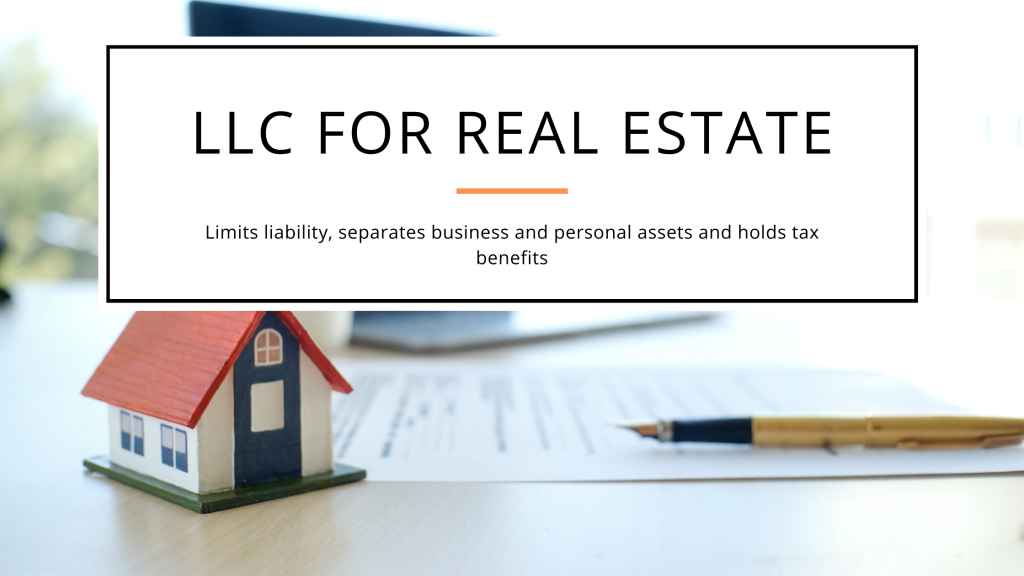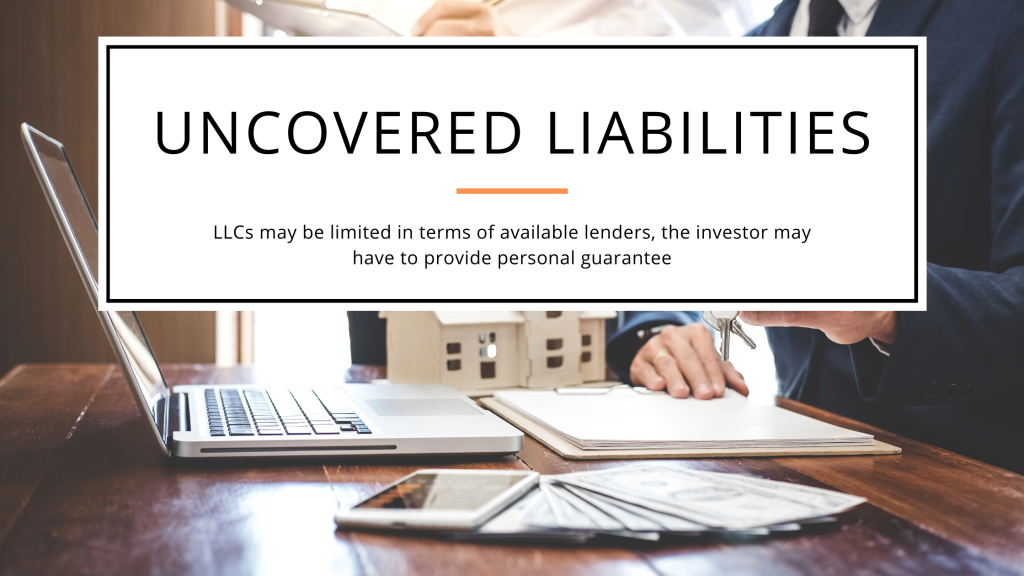When launching your own business, no matter the industry, it’s important for the business owner to consider how they can protect their business. This is also true of real estate businesses, and if you’re planning on a legal structure for your property investments, having a separate entity could be beneficial for legal and tax purposes. As a business owner, the legal structure you choose will have an essential impact on your ownership and transferal of assets like properties.
Many investors choose to structure their investments under limited liability companies (LLCs). The most common of legal structures, the real estate investor can sleep more soundly knowing that their assets are protected. But what if you want to take it one step further and start purchasing properties as an LLC? You’ll need to know if you can get loans as an LLC rather than an individual investor.
It’s natural to be curious about whether you can get financing to purchase real estate as a business. The answer is that yes, you can get real estate loans under the umbrella of an LLC. However, while it’s possible to get financing such as a mortgage through an LLC, there are limitations that can make the investor doubt how beneficial this approach will be.
The circumstances of the mortgage will be particularly important to consider before getting started. The way that lenders respond to your loan application may also be affected, as not all lenders will finance businesses purchasing real estate.
Keep reading for our full guide to taking on mortgages as an LLC:
Table of Contents
Basics of LLCs

Investors that set up their own LLCs typically do so as a way to protect themselves and their other assets from liability. Under the protection of an LLC, your business and personal assets are legally considered to be separate entities. This means that creditors won’t go after your personal assets should the business have debts it is unable to pay.
Investing in real estate is a lucrative business, which can bring good profits to the investor with little instability compared to other asset classes like the stock market. Despite this stability, investing in the property market is not without risk and it’s not uncommon for investors to struggle with unforeseen pitfalls.
In theory, by registering your own real estate LLC, your assets are covered should you run into any legal or debt issues. With a legal entity like an LLC, you will effectively conduct all of your property-based tasks as a business moving forward. Some real estate investors even establish multiple LLCs at the same time, with the goal of separating each property they have chosen to invest in from the others. This allows them to limit cross-liability even further.
This all sounds perfect on paper, and many investors decide to jump straight in and register once. However, if you take on a mortgage as an LLC, you may not be as protected as you think you are. For example, as an LLC you could be liable for deficiency if a foreclosure was to take place and it may require a personal guarantee.
If you’re planning to register an LLC and get loans for real estate with it, it’s key that you gain a more in-depth understanding of which liabilities you will be protected from and which ones you won’t.
When LLC’s Don’t Cover Liabilities

Part of understanding what your liabilities will look like when lending funds to invest in real estate as an LLC is to look at the lenders themselves.
One of the main reasons to launch an LLC, in this case, is to secure funding for future property investments. This should be a straightforward process, but the problem is that not all lenders cater to LLCs and prefer to work with individuals directly. In fact, with some lenders, it won’t matter if you’ve established an LLC at all.
Under specific circumstances, the mortgage lender can put the financial liability onto the business owner, even if the loan was taken out under an LLC. Some lenders refuse to finance LLCs or corporations altogether, while others will only grant mortgages if the business has a well-established credit history. The chances are good that if your LLC does not fulfill these criteria, you’ll need to go the extra mile to get the funding you need to successfully invest.
This means that if you have a new LLC without a credit history, you will likely have to give a personal guarantee as additional credibility and security for the lender to grant your loan. That personal guarantee effectively comes down to volunteering your personal assets as collateral should your business not be able to repay its loan.
In that case, you could be held personally liable for the remaining loan amount even if the loan was made out to the LLC you own.
This counteracts a lot of the reasons investors decide to launch their own LLC in the first place.
That doesn’t mean that creating an LLC for the purpose of investing in real estate is not a good option, as there are several other benefits particularly when it comes to taxes.
Transferring Mortgages To LLCs

Once your LLC has been formally organized and registered within your state, the company can enter into its own contracts and take on funding. This also means that the LLC can hold and transfer real estate titles. If you have owned property as an individual that you now want to put under the protection of the LLC you’ve created, you can not only transfer the title but also the mortgage.
Transferring a property with a mortgage to the ownership of an LLC will require the investor to take several steps. First, they need to complete what is known as a quitclaim deed. When these deeds are executed, they transfer any interest the grantor had in the property to a grantee, in this case, the LLC. Some states have specific laws around transferring ownership, so it may be worthwhile to follow up with an attorney. Transfer taxes could also apply.
The second step is to have the quitclaim deed recorded. The deed needs to be taken to a county clerk’s office, creating a public record of the transfer and ensuring that you are no longer associated with the deed personally. A nominal fee may apply, but this step is a legal requirement and cannot be skipped.
From there, the investor needs to do a few final things to complete the process fully. The most important is to notify the lender – with a mortgage on the property, it’s likely that you will be required to let them know any time there is a transfer in ownership. You’ll want to be careful to follow all of the stipulations laid out in the agreement you have made with the lender and ensure you are not jeopardizing your funding. Acquiring a mortgage from a lender will require that the LLC signs a legal obligation of debt between the two parties.
Be aware that this ownership change could lead to an increase in rates. It’s important to look at the terms offered by the mortgage lender you are working with before you officially enact the transfer.
Is Obtaining An LLC Mortgage Possible?

The biggest trouble that investors run into when buying properties as an LLC is being too new.
With a newly launched LLC, there is no track record for lenders to look at when considering your loan application. This makes it more difficult for the lender to decide to grant the funds to your LLC. As a result, lenders will require additional documentation and guarantees to secure a loan, especially because there is no history of income to work off of. Along with your personal guarantee, the lender may look at your personal credit or income history to determine whether the loan should be granted.
If you’re not interested in providing personal guarantees for loans taken out by your LLC, you should think about how you can create a credit history for it. What are some of the ways to build credit as an LLC and get a mortgage without having to add a personal guarantee you ask? You’ll need to build business credit for your LLC.
Business credit refers to the financial history of a company used by lenders to determine their suitability for a loan. This credit is ranked on a scale of 0-100, with 80 or more considered to be the most likely to get loan approval. A few of the steps you can take to build up this credit for your LLC are to obtain a federal tax identification number, open a business bank account and make payments to and from it and ensure everything is paid on time. Some investors put an already paid-for property under the LLC in order to give it some assets to work with out of the gate.
This is not an overnight process, but one that can definitely pay off in the long run. It’s a good idea to talk to a mortgage lender directly to ensure you are taking the right approach to building credit and listen to any recommendations they have for the process.
Final Thoughts
It is possible to get a mortgage as an LLC successfully if the circumstances are right, but it’s also important to think about the realities. An LLC may not protect you from all liability when you’re buying real estate, and with a new business, you will have to provide a personal guarantee to secure funding.
When obtaining a mortgage using this business structure, it’s important to predetermine which lender you will work with and what their requirements are. You’ll also want to think about some of the challenges of getting funding as a new LLC with no credit or income history. This can throw a spanner in the works, so it’s worthwhile to consider establishing credit in your LLC before officially taking on loans as a corporation.
If you go into the process informed of all the in’s and out’s this approach can be successful and a good way to manage multiple real estate investments at the same time.
The above is for informational purposes only, it is not legal, financial or tax advice/recommendation. Please contact your licensed tax advisor or lender if you have specific questions.



